SACO presents An Evening with Andrew Sords
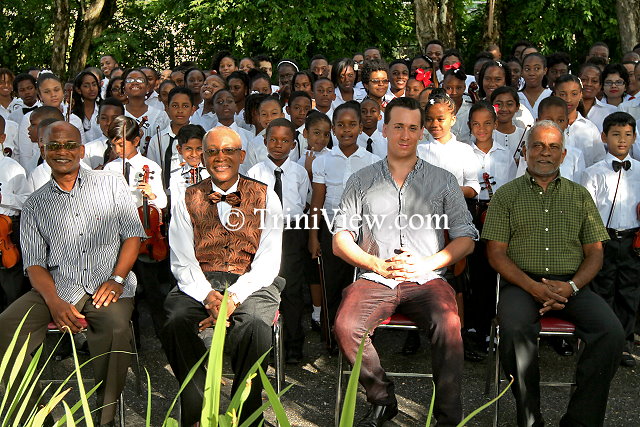
Andrew Listhrop manager of SACO, Kenneth Listhrop, founder and Musical Director of SACO, American Violinist Andrew Sords and Venezuelan Head Tutor, Mr. Heemath Jahoor with the orchestra
The weekend of the 21st and 22nd of March, 2015, was forever etched in the annals of Trinidad and Tobago’s historical calendar when the doors of Queen’s Hall in St. Ann’s opened to the gala event that was the classical concert, “An Evening with Andrew Sords.” Eager patrons glimmered in a variety of formal dress outfits and as the sun slowly dimmed over the domed arch of the Hall, giving way to the cool night. The collective anticipation sharpened as guests vied for the best seats from which to enjoy the show.
The founder of the Trinidad and Tobago Youth Philharmonic, musical director, teacher, accompanist, arranger and conductor, Mr. Kenneth Listhrop candidly chatted about the concert’s significance to Trinidad and Tobago saying:
This is a golden opportunity for our own orchestra and for Trinidad and Tobago. In the area of music, this has never happened before in Trinidad and Tobago. We’ve never had an orchestra of this standard that we could actually perform with an international soloist, and this speaks for the group of the orchestra if he’s comfortable coming to perform with us. It’s just really beautiful music we wish the country could hear because classical music is really the foundation of western music.
Mr. Sords is a violinist of international fame and having worked with over two-hundred orchestras around the world, it came as a complete surprise when Mr. Listhrop received his email requesting an opportunity to work with the TTYP. He grinned as he recalled that moment:
At first we thought it wasn’t real and then we realized it was real and we just jumped at the whole idea and the opportunity to make it happen. We started working on getting a venue and so on, and Queen’s Hall graciously obliged us. The timing was right with everything!
In just over two months, the orchestra, which was composed of mainly students from the advanced orchestra, pulled together a first-rate show. Age proved no barrier for a coveted spot in the orchestra so long as the student could perform the pieces in excellence and maintain consistency with rehearsal schedules. This youthful and vibrant collection of talented musicians boasted its youngest member of the orchestra at ten years of age and the eldest was not more than twenty-four years old.
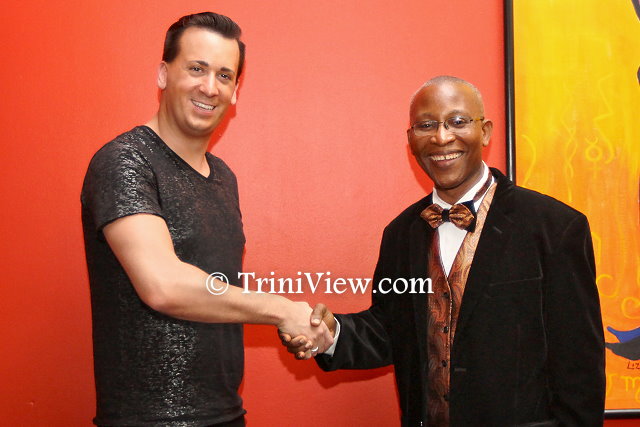
American Violinist Andrew Sords and Kenneth Listhrop, founder and Musical Director of SACO
Mr. Listhrop explained, “We are not like some of the developed countries where this [routinely] takes place, and we have had to educate [students] for them to see the value of what this show means.” He then shared that in addition to the fact that this concert was the first of its kind in Trinidad and Tobago, Mr. Sords had disclosed shortly after his arrival that Strings Magazine had asked him to submit an article on his experience working with the TTYP. He glowed as he explained:
Strings Magazine — that’s a magazine that is distributed all over the world for music education, particularly for strings … lots of articles about teaching techniques and different performers and so on — they’ve asked him to write an article on his experience with us. This is going to be distributed internationally, so people are going to be reading about us. If that alone is the only reason for the value of this, it’s worth it!
The announcement had served to amplify the excitement in the Listhrop camp. He shared:
I used to read those magazines with a passion; you can’t throw away those magazines because they have so much information. I have them at home and so many of the ideas in the magazines have made me a better teacher, because as a teacher, you have to keep reading and upgrading yourself with knowledge. I was on cloud nine as they say. I was totally elated to know that this is actually coming the way of this tiny little island, this lone voice in the wilderness of an orchestra, and to have this kind of opportunity to be read and people to be aware of us internationally, I think is a tremendous honour.
He philosophically noted that in addition to the international accolades which this concert was already garnering, that it was his wish that local audiences could similarly appreciate the efforts of the musicians, musing, “Everything they have learned, they learned right here. And to see the commitment, the sacrifice, to see what they are capable of doing, and with an international performer, I think that the audience needs to recognize, applaud, appreciate and support that.”
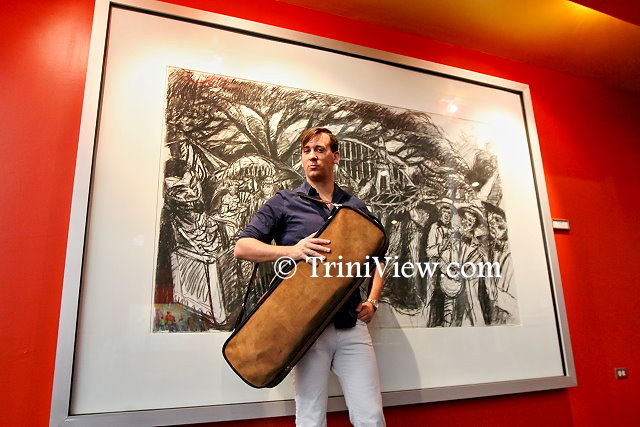
American Violinist Andrew Sords
The virtuoso himself, Mr. Andrew Sords, seemed to share the excitement humming through the building. He chatted with easy grace, stating, “I’m very excited to be the guest soloist this week and with the orchestra. The Trinidad and Tobago Youth Philharmonic moved me a lot.” He acknowledged his enjoyment of this, his first visit to the country, sharing his impressions saying, “Oh it’s wonderful! I came from snow and winter, so to be here where it’s ninety degrees [Fahrenheit], it’s fabulous! I want to be outside all the time. The culture is very warm; everybody you meet is friendly; everybody you meet is welcoming.” His enthusiasm for the upcoming concert shone as he expressed joy about working with the TTYP saying:
There’s nothing like being in rehearsals with these kids and looking around and seeing the smiles and enthusiasm and excitement. I’m inspired! The kids, they inspire me, you know? When you are eight, ten, twelve, fourteen and you have that excitement of hearing a wonderful symphony concerto for the first time, it might fade a little bit with age, but, I’m reminded of that excitement when I’m playing with these kids.
He cheerfully disclosed that Trinidadian audiences could look forward to, “A high octane performance. It’s going to be thrilling!” He expressed genuine appreciation for the extra days he got to spend working with the TTYP stating, “It’s good that I’m here for the whole week. Usually, I only have a couple rehearsals, but this week, we’ve had three or four rehearsals and I’m really getting to know some of these kids and the Listhrop’s more than I would have on just a three day weekend trip.” He humbly downplayed the heady allusions made about his extensive experience, noting, “Music is a different kind of job because it’s not a job: it’s your life. And so when you ask who I am, I don’t think that I’m really separate from the violin.” He offered a friendly smile as he described the experience of performing: “It’s very addictive to go on stage night after night and perform. There’s nothing like it … not that I like rollercoasters, but imagine it’s that kind of thrill when you step on stage and you’ve got a piece to convey to the audience. So when that gets old to me, I’ll stop playing, but for now, I have a long time to go.” He also divulged that second to his love for music was his love for food. He shared, “I’m a musician first and foremost, but everything comes back to food. I love trying new restaurants, I love trying different foods and here it seems I like a number of different cuisines.” He offered advice for any youngster seeking to nurture musical talent in the classical genre saying:
Practice! Practice! Practice! Kids now are in a world of instant gratification. They want to know something, they google it … it’s immediate … and it wasn’t so immediate when I was growing up. Internet was still new; we didn’t have cell phones … it was a lot of slow work and I would compare it to being an athlete or being a physician. It takes years and years and years of cultivating your talent … cultivating your practice habits to become a performer.
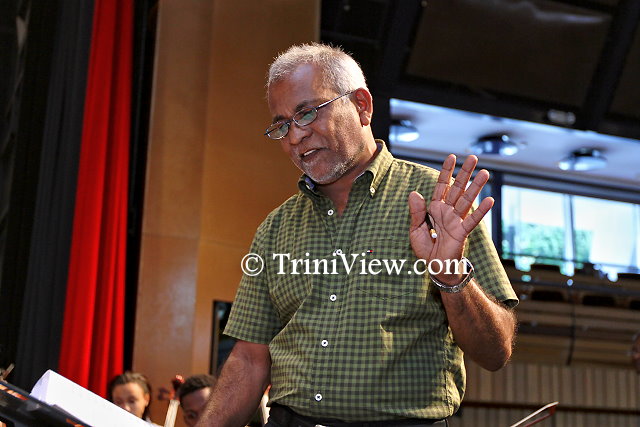
Venezuelan Head Tutor, Mr. Heemath Jahoor
Indeed, the effort which goes into producing such a show is not a singlehanded one. One of the stalwarts of support for the hard work by the St. Augustine Chamber Orchestra and the Trinidad and Tobago Youth Philharmonic in many of their endeavours is locally renowned Venezuelan Head Tutor, Mr. Heemath Jahoor. He regularly makes the journey to Trinidad in support of most concerts staged by SACO, teaching the students and assisting in perfecting the performance at hand. He lauded the work of this present group of musicians, saying, “I think they did a good job … they know exactly what’s happening. I think they’re doing a fantastic job.” He is an established music tutor in Venezuela, having migrated there from Trinidad over forty years ago to pursue a career in classical music. He described the experience of working with the SACO students as a positive one, stating, “I’m accustomed to doing this sort of job in Venezuela. The experience is in trying to get them to do the right thing. It’s a task to get them to do the right thing because they don’t have the experience that we have in Venezuela, no? However, they’re doing a fine job.” He shared a bit of his personal history disclosing that his journey in 1975 was propitious since it enabled him to become a founding member of the globally famous Youth Orchestra’s System in Venezuela. He explained,
In Venezuela, there is a system of youth orchestras established all over the country. All the states have their own orchestras. It started in 1975. When I went across there it had now started and I became a member, but now it is all over the country and all these European countries use it as an example. For example, in Germany they were there for six to seven months with about forty or fifty tutors there to learn and see what we do across there.
He opined that Trinidad could sustain a system like that with people like SACO’s executive and the Queen’s Hall administrative team guiding by example. However, he lamented that the present structure in place in Trinidad and Tobago offered little support to sustain the musicians, thereby failing to promote the development of the genre on a broader scale, saying, “The thing is, once students start University, they leave and they have to start back again, so it’s not evolving the way it should be. So every five or six years, we have new members and we have to make a new orchestra. That’s where the problem is really… there is no future for them here, when it comes to working. So they leave and they go to university and that’s it. So we start back and try to maintain it … that’s all.”
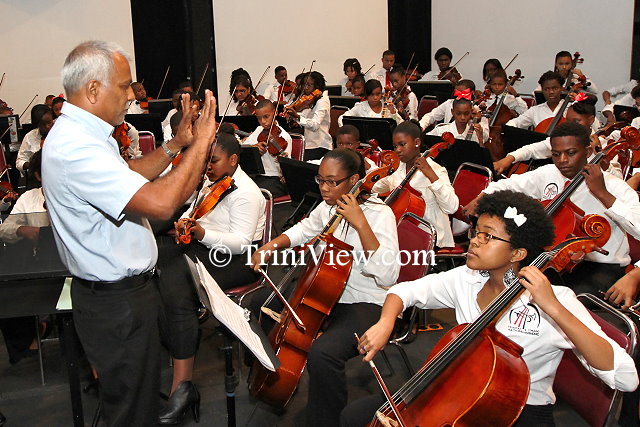
Venezuelan Head Tutor, Mr. Heemath Jahoor during rehearsals with the orchestra
He pointed out that although a foundation was responsible for running the programme which stands today in Venezuela which promotes and cultivates talent in the musical arts, the main support was derived from the government. Stipends are paid in addition to salaries for the musicians for the upkeep of their instruments and their families and he believed that this is needed in Trinidad if the musical genre is to be adequately cultivated beyond the age of a university graduate. Locally, it is, however, still a fairly unknown genre which has spawned a largely self-reliant community in the land of calypso and steelpan. Jahoor went on to elaborate on his life experiences leading to his career in music:
I lived it. I leave and went across there where I am totally dedicated to music. I used to work at the St. Ann’s Hospital when I finished high school here. I was a checker for the Ministry of Works. I spent about six or seven months there. My brother had some connection in Venezuela and he asked me if I wanted to go and I said, ‘yes, why not?’ So that was Friday, and by Monday morning, I was in Venezuela.
He went to Venezuela with the intention of pursuing his dream of a career in classical music, smiling reminiscently as he added, “I was 19 years old. That was adventure!” Despite having no knowledge of Spanish he made the journey and was almost immediately successful, thanks to his early formal music training and experience via Mr. Desmond Walcott of San Fernando. He has no regrets about his choice and disclosed that he has a lot of students in Venezuela where he dedicates more of his time to teaching. His frequent returns to Trinidad to assist SACO is an act of love for the music as he affirmed, “I’m very interested in this movement really, to see something happen in Trinidad. This is my country; I was born here. I give all my energy here when I come in.” He smiled again as he added, “I hope for the best and see if we can create a future for classical music.”
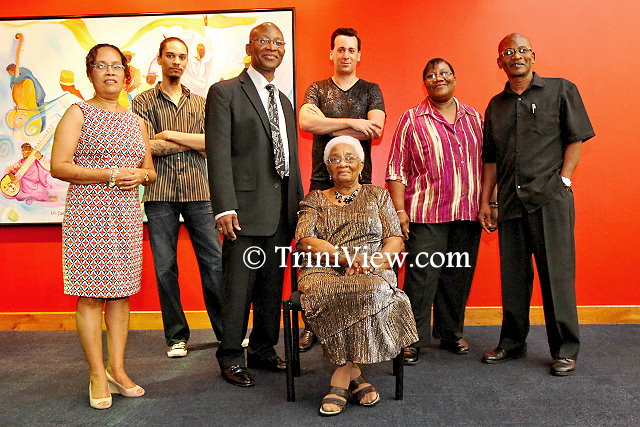
A group shot with Andrew Sords and the Listhrop family
Another devotee to the genre of classical music, and an instrumental presence to the staging of this particular concert is chairman of the St. Augustine Chamber Orchestra, Mr. Andrew Listhrop. He expressed keen joy and excitement about the concert and admitted that in addition to his duties as chairman the governing body of the Trinidad and Tobago Youth Philharmonic, he was also the event coordinator for all the concerts and would even wear the hat of stage manager from time to time. He explained:
To put a concert together like this, or any concert would require a lot of planning, it would require financial input, it would require marketing and many other aspects to make a concert like this a tremendous success and this is where I come in with my team. As chairman of the board, the board members they assist me as well as a team of committed parents who shares SACO’s vision and who assist us on a voluntary basis at every concert to make sure that everything is executed as planned and that the concert is a total success to the enjoyment of everyone who attends.
The organization’s success is in no small way attributable to the efforts of the Listhrop family. He shared the story of their musical roots saying:
Our family, we have what you would call a musical history. We were first introduced to the arts by my father who was born in Lagos, Nigeria. He used to work for a British company called International Air Radio. Every summer vacation, they used to send my father away for training to England. My father would take his children with him with my mother to England during the summer vacation when he was on training. And it was in England that we were exposed to seeing orchestras performing in the park. You turn on the television and you see orchestras performing because Europe is a cultural centre. Remember England and Europe is the home of what you would call the classical tradition. So it was there that we were introduced to it and we were very much attracted to it. When my father came back from one of the visits, he bought a piano and he sent myself, my brother Kenneth and my sister to take piano lessons. I never kept up with it, really. My sister did and my brother did as you can see what it has mushroomed into. But I do have a very deep appreciation and love for the arts, especially the musical arts and classical music.
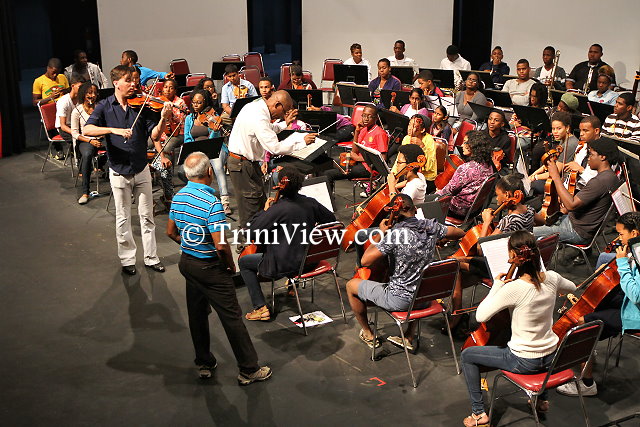
Andrew Sords, Kenneth Listhrop and Mr. Heemath Jahoor during rehearsals with the orchestra
His own love of music has culminated in his supportive efforts for more than a decade with SACO. The preparation for this show was somewhat different to the other shows and he acknowledged that:
It was different in the sense that this guy doesn’t live here. Most of our concerts are planned locally; it has local input in terms of players and singers and what have you. But this international concert violinist was coming from the United States, so obviously we had to put things in place to make sure that he arrives here [and] he’s well taken care of. We had to have the orchestra prepped and ready for when he comes because he’d be rehearsing with the orchestra, and we have to set up rehearsal schedules to make sure that when he comes here he’s aware of the scheduling and to practice with the orchestra so that we will be well prepared for the concert. Obviously, since this man is an acclaimed violinist, there would be a lot of planning and a lot of things that we would have to consider in making sure that a person of his calibre is well-received here and that he is given all the tools necessary and [ensure] that all the avenues are created for this concert which is “An Evening with Andrew Sords accompanied by the Trinidad and Tobago Youth Philharmonic” to be a tremendous success.
Listhrop commended the efforts of the young musicians, declaring,
This was their first experience working with an internationally acclaimed violinist so obviously I know that while they were excited, some of them were a bit nervous. They were asking themselves if they were up to the challenge to appear in concert accompanying such a talented musician. But you know something? Our young people of the orchestra, they always rise to the challenge. They always make my brother and myself proud. The Head Venezuelan tutor is always there, sometimes with a team of teachers to ensure that the orchestra is always well-prepared and always raising the bar … raising the standard. In a nutshell, they (the children) rose to the challenge, and I know that Mr Sords, he is well pleased.
The view that this concert is a dream realized for the local classical music community was repeatedly expressed throughout the evening.
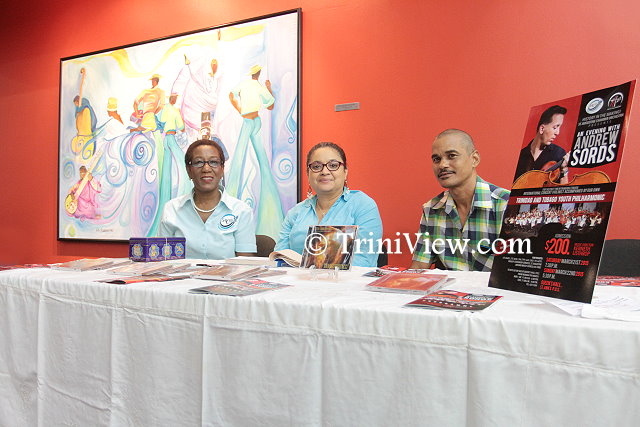
SACO parents
Another important mechanism in the staging of this concert is its team of parent volunteers, the “SACO Parents”. One of the most recognizable faces in this group is that of Mr. Neil Parman who has been associated with the group for several years. The SACO Parents is a collection of those who have had their children pass through SACO and volunteer their time and efforts to ensure that the musicians receive the required assistance, chaperoning where necessary, supplying the support for the children whose parents are unable to run the gauntlet of rehearsals with them, assisting backstage and counselling the young musicians when they become nervous. He explained, “We have a small core of parents; every show, they will be here.” He further clarified that the effort they make is not just for the individual children but it also forms part of a collective endeavour made towards the future of classical music in Trinidad and Tobago, to build as strong a foundation as they can for the niche which SACO has carved in the national psyche. His daughter Sarah, aged thirteen, is also a member of the concert’s orchestra. He affirmed his belief that a programme like SACO’s could only be a positive, saying, “In light of what we see happening to our youth, that’s why I’m involved in it because I’m very impressed with what I see … what it’s doing for these children.” He lauded the children who, despite being exposed to different types of musical genres opted to be a part of a classical orchestra and embrace the discipline that such a decision entailed. “I love being a part of it … I love seeing what they’re doing; it’s very encouraging to me,” he remarked.
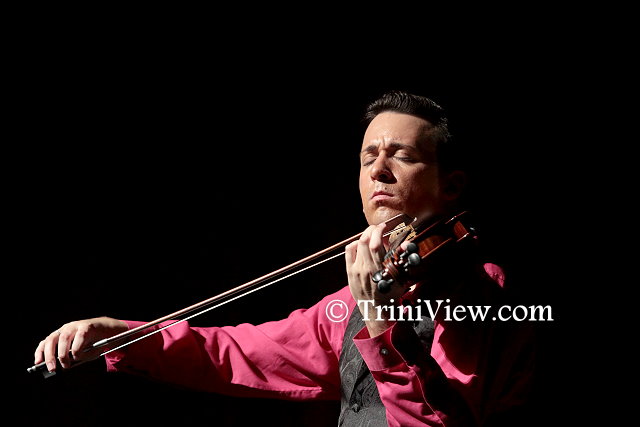
American Violinist Andrew Sords
Ms. Astrid Moses was another parent attending the show and cheerleading her son’s musical achievements. Young Gavrie Moses is, at twelve years of age, a Standard Five student of the Pinehaven Estate Primary School and he plays the violin. She acknowledged that although it was sometimes tough, “When your children are involved in something and they show genuine interest, you have to be in there with them. It’s exhausting, but when you see progression in their exams and how they do well, you know you want to be there for them to support them and encourage them to continue going where they are.” She added, “Mr. Listhrop’s programme … his concerts are usually entertaining … there’s never a dull moment. You’re never dissatisfied at the end of a performance, so I’m looking forward to him staying consistent and doing what he accustomed doing.”
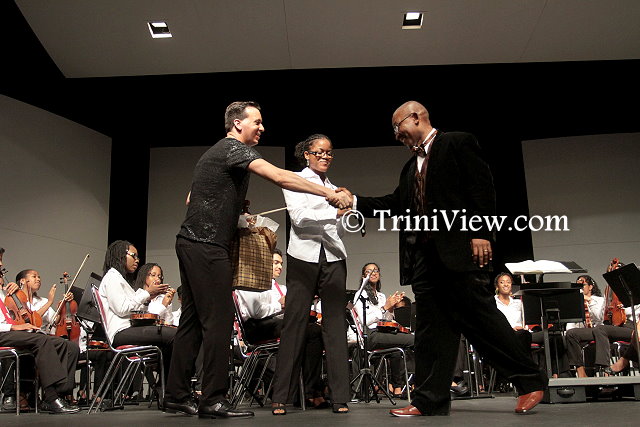
Andrew Sords receives a token of appreciation from Kenneth Lishtro on behalf of SACO
The young musicians seemed animated as they readied themselves. One such person was Ms. Chelsea Fensom, a Form One student of St. Joseph Convent, Port of Spain. Her instrument for the show was the cello and she exclaimed, “I’m really excited. This is the first time I’ve heard a guest performer come and perform with us … it’s really exciting.” Her parents were there to witness their daughter be a part of history and she glowingly paid tribute to the man of the hour, Mr. Sords, saying, “He’s really fun to work with! He gives us a lot of advice and good tips for the strings.” Another bubbly youngster who was performing was eleven year old Amari Lee Manigat, a Standard Five student of the Renaissance Preparatory School for Boys and Girls in Vistabella. He declared that he had jumped at the opportunity to work with Mr. Sords, noting that it wasn’t every day that a musician of “Mr. Andrew’s calibre is in the country!” He described his experience meeting Mr. Sords in this way: “It was great! I met him, I talked to him, he signed my t-shirt, I shook his hand, he spoke to me, I introduced him to my aunt and it went well!” Amari credited his aunt, Ms. Uklyn Ferguson, for giving him the opportunity to attend music school and encouraging his passion in classical music and it meant a great deal to him that she was able to meet his idol and hear them both play. Seventeen year old violinist, Jerome Ifill, is a Form Five student of Fatima College. He admitted that while he was interested in strings, he was also trained to play the piano. He calmly disclosed that he was not nervous and was not distracted by any emotion at this time, observing that for him, “the feelings come out when I play.”
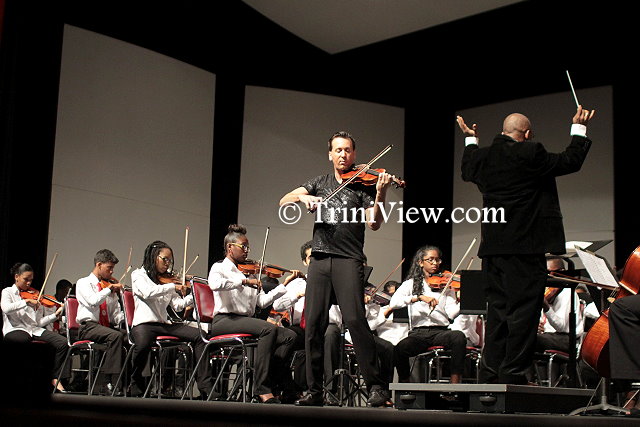
Andrew Sords and Kenneth Listhrop in concert
The little musicians twittered amongst themselves as they positioned their bows in readiness. Then the red curtains slid apart and they fluttered onto the stage, eyes alert and bodies poised with instruments in hand. Their excitement beamed through their gladdened faces as they nestled their instruments. The meticulous care which was taken to play with synchronized timing was in strong evidence as the music soared and flew, capturing the full attention of the audience. Mr. Sords proved himself a congenial host expressing his pleasure at having the opportunity to work with the orchestra, bantering with the audience and conversationally sharing vinaigrettes of musical history between pieces. He successfully held the audience spellbound with his expertise as the notes soared off his one-hundred and three year old Belgian Violin, a constant feature in many of his performances.
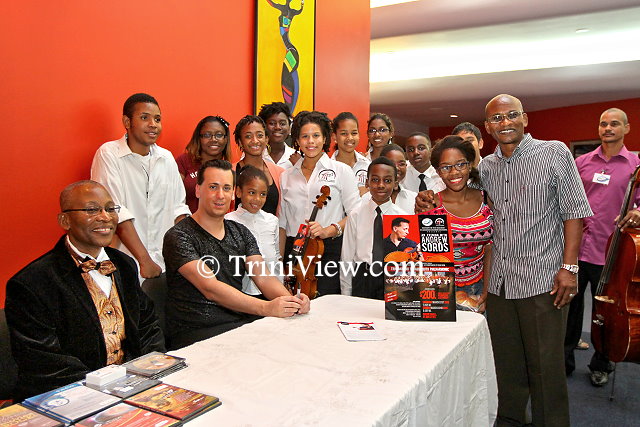
Kenneth Listhrop, Andrew Sords and Andrew Listhrop with SACO’s students and parent
After the concert, he took to the lobby where he autographed copies of his CD for the numerous fans who stood in line for the opportunity to interact with him, albeit briefly. His down to earth demeanour was open and engaging, and scores of young people flocked to him, coaxing for an autograph and a pose with the world famous musician for the ubiquitous “selfie.” His display of patience at the excited barrage of requests was endearing as he gave each child the photo opportunity which they sought. Mr. Sords has struck a high bar for his musical successors.
SACO presents An Evening with Andrew Sords in pictures:
www.triniview.com/gallery/main.php?g2_itemId=813391